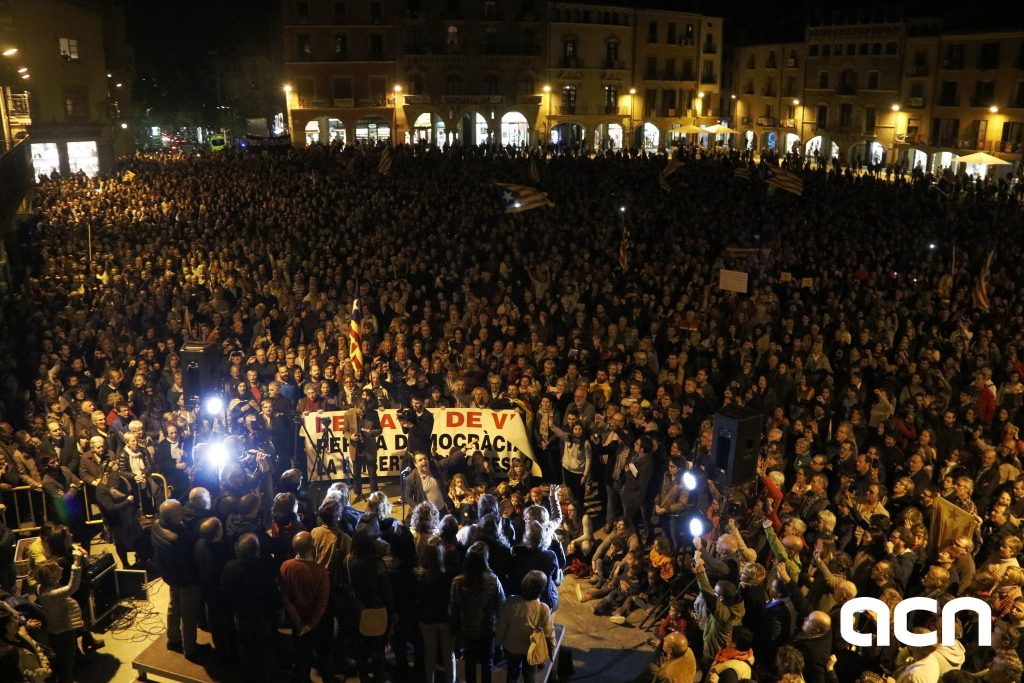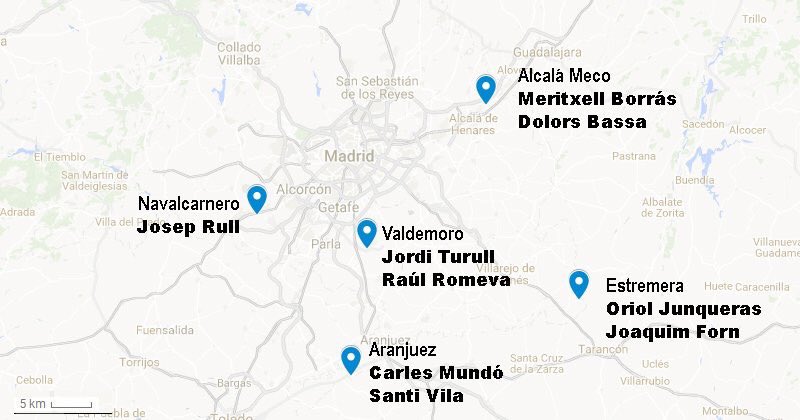A Rebellion Against Nationalism


The imprisoned Catalan government ministers include: Oriol Junqueras, Raül Romeva, Carles Mundó, Dolors Bassa, Meritxell Borràs, Jordi Turull, Josep Rull, Joaquim Forn
The arbitrary imposition of this exceptional ‘legal’ response reflects the despotic nature of the ruling PP’s determination to maintain obedience to the Spanish state in its province of Catalonia at all costs. It also reflects the nervousness about the prospect that self-determination opens up new space for a genuinely different society. This, after all is a state that is born out of a unique moment of civil disobedience and that means something very significant indeed.
The Catalonian movement is increasingly characterized by a popular mobilization against nationalism: the explicitly nationalist authoritiarianism of the Spanish state.
In the last decade or so, the resistance to Madrid’s authoritarian nationalism has gathered momentum. Since the PP lost the election in 2004, its strategy has been to regain electoral appeal by deploying an ever more crude brand of Spanish nationalism. This has meant overt confrontation with the principle of Catalonian autonomy, and even resulted in some bizarre strategies such as calls for boycott of Catalonian produce by groups linked to the PP. People now talk about Catalanophobia. Anyone who saw the crowds sending off the armed guards of the Spanish National police from their barracks across Spain last month with the chants “go get ‘em” will understand this is not an exaggeration.


The centrality of this formal and parliamentary political resistance should not obscure the fact that the Catalonian declaration of independence was only made possible by a popular rebellion, by the power on the streets that physically prevented the state from disrupting the vote. The struggle for self-determination in Catalonia means something significant and potentially revolutionary because it opens up new possibilities for a different political and economic settlement.
First, it means the rejection of the authority of the King: the demand for independence seeks to establish a republic without a monarch. We are often told that in the context of modern democracies like the UK, Denmark or Spain, the monarchy is merely a docile and harmless relic of a symbolic power. In the context of Spain, rejecting the monarchy means something very specific. It means that means Catalonia is washing its hands of a corrupt royal family that stood at Franco’s right hand. Of course, this pressure point: the rejection of the authority of the King is a feature of the struggle that has brought the fascists onto the streets. In Valencia the local fiesta on the 9th October was marred with widespread violence by Fascists against anyone demonstrating solidarity with Catalonia. In Zaragoza a march for Spanish unity was lead by the leader of the Falange, the heirs of Franco’s one-party state that have barely been seen in public for 40 years. In Barcelona Spanish unionist marches have been followed by serious attacks against journalists, migrants, and left political activists.
Second, it means a new republican constitution, a new set of institutions and a new political settlement. Of course, this could easily mean the status quo. But equally it might not. During the weekend following the declaration of independence, an international solidarity delegation met, hosted by the left independence party, the CUP, to demonstrate solidarity against the repression and to discuss exactly what this new republic should look like. This delegation included representatives from left organisations in Scotland, Belgium, Italy, Quebec, Wallmapu, England, Greece and Ireland. The ‘Declaration of Barcelona’ that was discussed and agreed at this meeting is a remarkable document for an independence movement. The Declaration asserts that, “The Catalan struggle does not merely seek the establishment of yet another nation state.” It goes further, distancing itself from nationalist struggles: “The Catalan struggle is the opposite of the recent rise of nationalism that has given momentum to extreme right-wing and fascist forces across Europe. The values that drive it are born out of solidarity and resistance to the diseased state of Spain and Europe.”
The left independence movement is seeking to build a participatory democracy that is not merely an expression of the right or desire to vote, but one that has at its core is a long term project for social transformation in this new republic.
*


We can’t continue without more of our readers supporting us.
The money will go towards developing Bella as a platform for writers, filmmakers and artists, something that no-one else is doing in Scotland.

Yeah, we know the story.
But what’s the answer. Where do folks one go when the system runs brutally against them.
Might is right. No doubt about it. Beats eloquent theorising every time.
In 2006 Spain had a left wing government under Zapatera. This passed, or accepted, a statute of Catalonian autonomy which widened the powers of the Catalonian government and acknowledged Catalonia as a nation rather than a region. But this was overturned by Rajoy in 2010, when he and his right wing government came to power, and as the article states, the central government in Madrid under Rajoy has since revoked recent progressive legislation passed by the Catalan Government to much chagrin by those on the left. Whilst on the right there are those concerned that Spain taxes Catalonia too much and uses it as a cash cow.
It’s quite clear to me that the Spanish constitution of 1978 is an incoherent mess, cobbled together after the death of Franco and incomplete. Whilst affirming the unity of Spain it allows regional autonomy. Regional autonomy has grown in the last 40 years, and from Rajoy’s perspective, is now threatening the stability of Spain.
What is, or rather, was, needed, was a review of the Spanish constitution and setting it up as more of a federation, to reflect current realities. Canada remains a very stable state but is federal in structure. This could easily have been achieved in Spain, especially as a large number of Catalans were quite happy to remain part of the Spanish union, United by wider ties of history and geography, but it is probably too late now, thanks to Rajoy’s ham fisted actions.
LooK, MBC, I am totally on the side of the right of the Catalan people to self determination and I abhor and condemn the actions of the Spanish State.
But it is Britain which has a weird Constitution, not Spain…
The Spanish Constitution is a calque of the German Constitution….
Willy Brand fought in the International Brigades, it was the Germans who brokered the Spanish Transition to democracy, you ignoramuses…
Don’t slight the rights we have in Spain, okay?Enough of slighting the very good people of Spain.
A lot of people died for the rights of the people of Spain…
I would put “my hand in the fire” for five or six neighbours in my barrio…I wouldn’t put my hand in the fire for MacWhirter or George Kervan, or Craig – “I’ve never been a pacifist” – Murray….
You have no idea what you’re talking about.
The Wee Ginger Dug does. Paul does…
The Spain/Catalan situation and international non-reaction now raises significant doubts whether the British state would accept a Yes vote in any Scottish referendum, assuming another referendum is even permitted that is. Scots would therefore be better advised to use the existing elected majorities of MPs and MSPs favouring independence to give notice to withdraw Scotland from the union (i.e. the way in which it was legally constituted), and/or to contest any further national elections on the single issue of independence and to seek (another) majority of seats in favour. We should not trust or depend on perfidious albion, nobody else does.
I was astounded to hear Anna Arque say today (in Edinburgh, at the Scottish Independence Convention) that all but two of Catalan’s First Ministers have ended up either imprisoned or exiled since the mid 1940’s.
Can that really be true? Maybe I mis-heard?